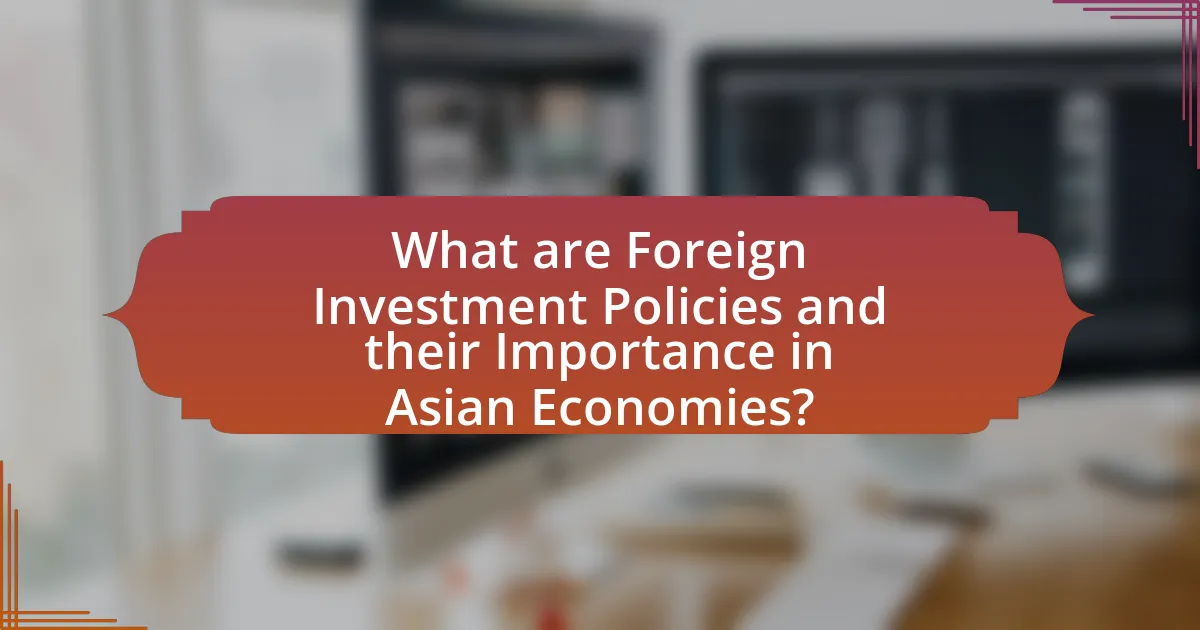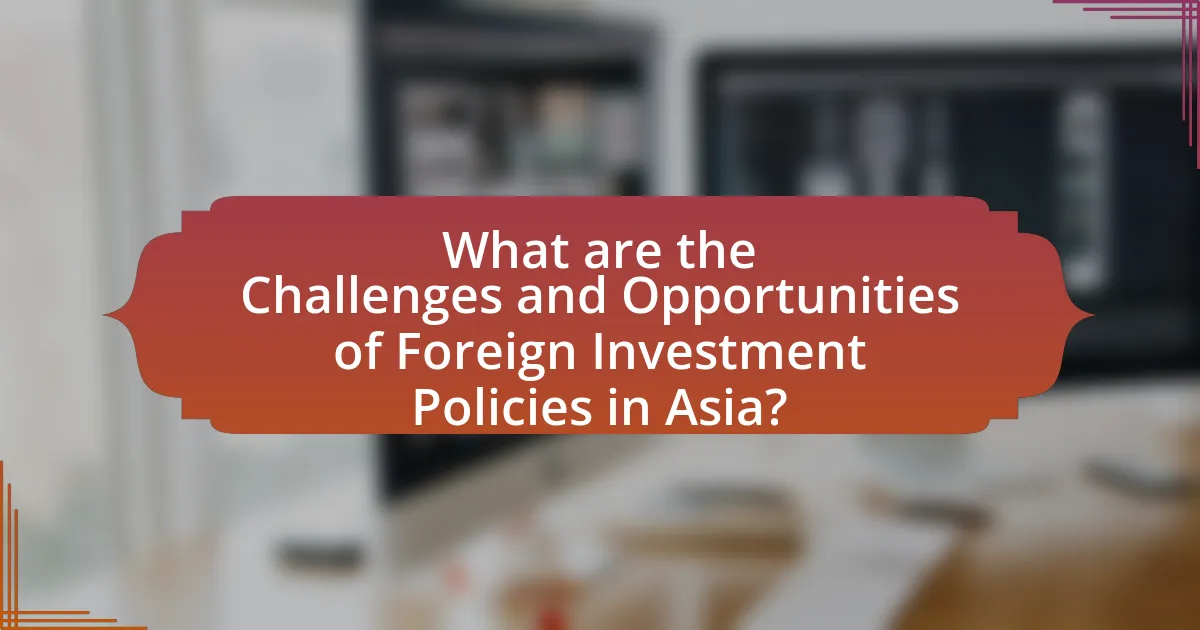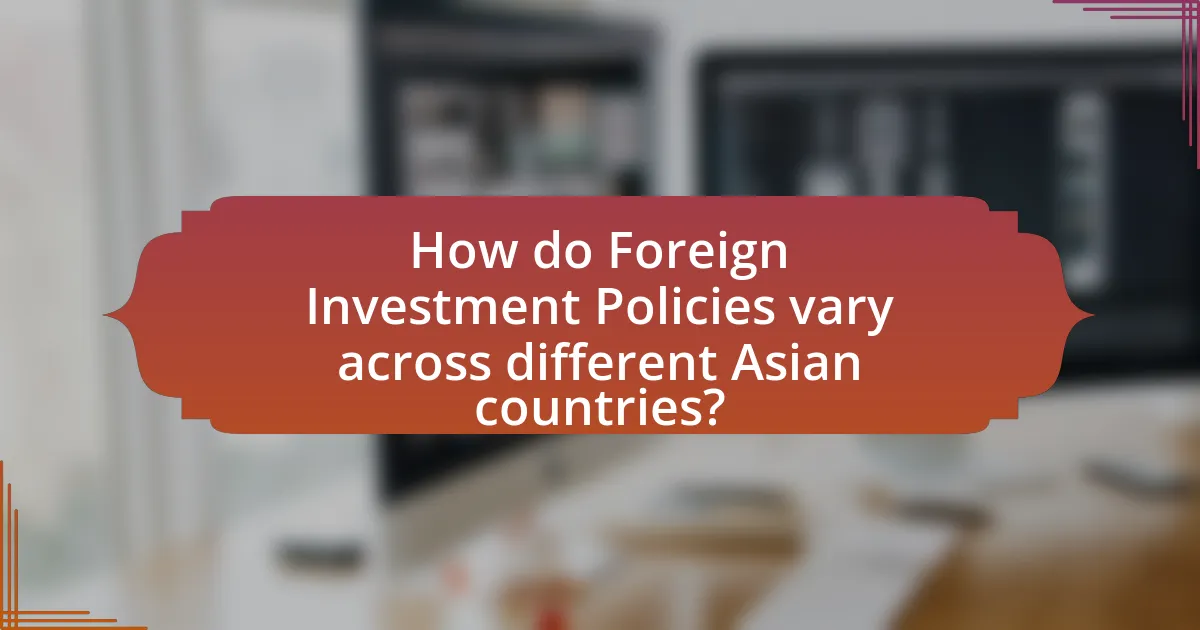Foreign investment policies are essential regulations established by governments to manage and promote foreign investments, significantly impacting economic growth in Asian economies. These policies attract capital, technology, and expertise, fostering job creation, infrastructure development, and innovation. The article examines the key components of effective foreign investment policies, their influence on investor confidence, and the role of government regulations in shaping these policies. It also highlights the challenges and opportunities faced by Asian countries in implementing these policies, the socio-economic benefits of attracting foreign investment, and the varying approaches taken by different nations in the region.

What are Foreign Investment Policies and their Importance in Asian Economies?
Foreign investment policies are regulations and guidelines established by governments to manage and encourage foreign investments within their economies. These policies are crucial in Asian economies as they attract capital, technology, and expertise, which can lead to economic growth and development. For instance, countries like China and India have implemented favorable foreign investment policies that have significantly boosted their GDP growth rates, with China attracting over $163 billion in foreign direct investment in 2020 alone. Such policies not only enhance infrastructure and create jobs but also foster innovation and competitiveness in the global market, making them vital for the economic advancement of Asian nations.
How do Foreign Investment Policies impact economic growth in Asia?
Foreign investment policies significantly impact economic growth in Asia by attracting capital, technology, and expertise, which enhance productivity and innovation. For instance, countries like China and India have implemented favorable foreign investment policies, resulting in substantial inflows of foreign direct investment (FDI). According to the United Nations Conference on Trade and Development (UNCTAD), FDI inflows to Asia reached $512 billion in 2020, contributing to job creation and infrastructure development. These policies often include tax incentives, streamlined regulations, and protection of investor rights, which create a conducive environment for foreign businesses. Consequently, the positive correlation between foreign investment policies and economic growth is evident in the rapid development of Asian economies, as seen in the rise of manufacturing and service sectors driven by foreign investments.
What are the key components of effective Foreign Investment Policies?
Effective Foreign Investment Policies consist of several key components: regulatory framework, investment incentives, transparency, and protection of investor rights. A robust regulatory framework establishes clear guidelines and procedures for foreign investors, ensuring compliance and reducing uncertainty. Investment incentives, such as tax breaks or grants, attract foreign capital by enhancing the profitability of investments. Transparency in policy-making and implementation fosters trust and encourages investment by providing investors with reliable information. Lastly, protection of investor rights, including legal recourse and dispute resolution mechanisms, safeguards foreign investments against arbitrary actions. These components collectively create an environment conducive to foreign investment, which is crucial for economic growth in Asian economies.
How do these policies influence foreign investor confidence?
Foreign investment policies significantly influence foreign investor confidence by establishing a predictable and stable regulatory environment. When countries implement transparent policies that protect investor rights, reduce bureaucratic hurdles, and offer incentives such as tax breaks or investment guarantees, they create a favorable climate for investment. For instance, according to the World Bank’s Ease of Doing Business report, countries that rank higher in regulatory quality tend to attract more foreign direct investment, as investors seek environments where their capital is safeguarded and can yield returns. Thus, effective foreign investment policies directly correlate with increased investor confidence and willingness to invest in a country’s economy.
What role do government regulations play in shaping Foreign Investment Policies?
Government regulations are crucial in shaping Foreign Investment Policies by establishing the legal framework and guidelines that govern foreign investments. These regulations determine the conditions under which foreign entities can invest, including restrictions on ownership, sectors open to foreign investment, and compliance requirements. For instance, countries like China have specific laws that limit foreign ownership in certain industries, which directly influences the flow of foreign capital. Additionally, regulations can include incentives such as tax breaks or subsidies to attract foreign investors, as seen in Singapore’s policies that promote foreign direct investment. Thus, government regulations not only set the parameters for foreign investment but also actively encourage or deter investment flows based on the regulatory environment.
How do regulatory frameworks differ across Asian countries?
Regulatory frameworks across Asian countries vary significantly in terms of foreign investment policies, reflecting diverse economic priorities and governance structures. For instance, countries like Singapore and Hong Kong have established open and business-friendly regulatory environments that attract foreign investment through low tax rates and minimal restrictions. In contrast, India has a more complex regulatory framework with sector-specific restrictions and a requirement for foreign investors to navigate bureaucratic processes, which can deter investment. Additionally, China employs a dual system where foreign investment is encouraged in certain sectors while restricted in others, such as technology and media, to protect domestic industries. These differences are influenced by historical contexts, economic development stages, and political ideologies, impacting the overall attractiveness of each country for foreign investors.
What are the implications of these regulations for foreign investors?
The implications of these regulations for foreign investors include increased compliance costs and potential barriers to entry in Asian markets. Foreign investors may face stricter reporting requirements and limitations on ownership stakes, which can affect their investment strategies and profitability. For instance, regulations that mandate local partnerships or impose caps on foreign ownership can limit the operational control of foreign entities, thereby influencing their decision-making processes. Additionally, changes in regulatory frameworks can lead to uncertainty, making it challenging for foreign investors to assess risks and returns accurately. This dynamic can deter investment or shift investor focus to more favorable jurisdictions, ultimately impacting the flow of foreign capital into Asian economies.
Why are Foreign Investment Policies critical for developing Asian economies?
Foreign Investment Policies are critical for developing Asian economies because they attract capital, technology, and expertise necessary for economic growth. These policies create a favorable environment for foreign investors by ensuring legal protections, tax incentives, and streamlined regulations. For instance, countries like Vietnam have implemented specific foreign investment laws that led to a 7.02% GDP growth in 2021, demonstrating the direct impact of such policies on economic performance. Furthermore, foreign direct investment (FDI) has been shown to enhance local industries and create jobs, as evidenced by the 1.5 million jobs generated in India through FDI in the manufacturing sector from 2014 to 2020. Thus, effective Foreign Investment Policies are essential for fostering sustainable development in these economies.
How do these policies facilitate technology transfer and innovation?
Foreign investment policies facilitate technology transfer and innovation by creating an environment that encourages foreign companies to invest in local markets, which often includes sharing advanced technologies and practices. These policies typically include incentives such as tax breaks, reduced tariffs, and streamlined regulatory processes that attract foreign direct investment (FDI). For example, countries like Singapore and Vietnam have implemented policies that not only attract FDI but also mandate technology transfer as a condition for investment, leading to significant advancements in local industries. Research indicates that regions with favorable foreign investment policies experience higher rates of innovation, as evidenced by increased patent filings and the establishment of research and development centers by multinational corporations.
What are the socio-economic benefits of attracting foreign investment?
Attracting foreign investment provides significant socio-economic benefits, including job creation, technology transfer, and increased economic growth. Job creation occurs as foreign companies establish operations, leading to direct employment opportunities and stimulating local economies. For instance, a study by the World Bank indicated that foreign direct investment (FDI) can create thousands of jobs in developing countries, enhancing local employment rates.
Technology transfer is another crucial benefit, as foreign investors often bring advanced technologies and practices that can improve productivity and efficiency in local industries. Research from the United Nations Conference on Trade and Development (UNCTAD) shows that countries receiving FDI experience a boost in innovation and skills development among the local workforce.
Moreover, foreign investment contributes to increased economic growth by enhancing the overall productivity of the host economy. According to the International Monetary Fund (IMF), countries that attract FDI typically see a rise in GDP growth rates, as foreign capital inflows can lead to improved infrastructure and services.
These socio-economic benefits collectively enhance the living standards of the local population and contribute to sustainable development in the region.

What are the Challenges and Opportunities of Foreign Investment Policies in Asia?
Foreign investment policies in Asia present both challenges and opportunities that significantly impact economic growth. Challenges include regulatory inconsistencies, political instability, and protectionist measures that can deter foreign investors. For instance, countries like India have faced criticism for complex tax regulations and sudden policy changes that create uncertainty for investors. Conversely, opportunities arise from the region’s rapid economic growth, large consumer markets, and increasing integration into global supply chains. For example, Southeast Asian nations have attracted substantial foreign direct investment (FDI) due to their strategic location and favorable demographics, with FDI inflows reaching approximately $137 billion in 2020, according to the United Nations Conference on Trade and Development (UNCTAD). Thus, while challenges exist, the potential for economic advancement through foreign investment remains significant in Asia.
What challenges do Asian countries face in implementing effective Foreign Investment Policies?
Asian countries face several challenges in implementing effective Foreign Investment Policies, including regulatory inconsistencies, political instability, and inadequate infrastructure. Regulatory inconsistencies arise from varying laws and regulations across different regions, which can create confusion for foreign investors. Political instability, often characterized by changes in government or policy direction, can deter investment due to perceived risks. Additionally, inadequate infrastructure, such as poor transportation and communication systems, can hinder the operational efficiency of foreign businesses. According to the World Bank, countries like India and Indonesia have struggled with these issues, impacting their ability to attract and retain foreign direct investment.
How do political instability and corruption affect foreign investment?
Political instability and corruption significantly deter foreign investment by increasing risks and uncertainties for investors. When a country experiences political turmoil, such as frequent changes in government or civil unrest, it creates an unpredictable environment that discourages long-term investment commitments. For instance, according to a study by the World Bank, countries with high levels of political instability see a reduction in foreign direct investment (FDI) by up to 50% compared to more stable nations.
Corruption further exacerbates this issue by increasing operational costs and creating barriers to entry for foreign investors. Corrupt practices, such as bribery and lack of transparency, lead to an uneven playing field, making it difficult for foreign companies to compete fairly. The Transparency International Corruption Perceptions Index indicates that countries with higher corruption levels tend to attract significantly less FDI, as investors seek environments where their investments are protected and the rule of law is upheld.
In summary, political instability and corruption create a hostile investment climate, leading to decreased foreign investment due to heightened risks and operational challenges.
What are the barriers to entry for foreign investors in Asian markets?
Barriers to entry for foreign investors in Asian markets include regulatory restrictions, cultural differences, and market access limitations. Regulatory restrictions often manifest as complex legal frameworks that vary significantly across countries, making compliance challenging. For instance, countries like India have stringent foreign direct investment (FDI) policies that require government approval for certain sectors, which can delay entry and increase costs. Cultural differences can hinder effective communication and negotiation, as local business practices may not align with foreign investors’ expectations. Additionally, market access limitations, such as tariffs and quotas, can restrict foreign companies from competing effectively against local firms. According to the World Bank’s Ease of Doing Business Index, countries like Indonesia and Vietnam rank lower due to these barriers, impacting foreign investment inflows.
What opportunities can arise from improved Foreign Investment Policies?
Improved Foreign Investment Policies can lead to increased capital inflow, fostering economic growth and development. By creating a more favorable investment climate, countries can attract foreign investors, which can result in job creation, technology transfer, and enhanced productivity. For instance, according to the World Bank, countries that have streamlined their investment regulations have seen a significant rise in foreign direct investment (FDI), which can boost GDP growth rates by up to 1.5% annually. Additionally, improved policies can enhance the competitiveness of local businesses by exposing them to international markets and best practices, ultimately contributing to a more robust economic environment.
How can regional cooperation enhance foreign investment flows?
Regional cooperation can enhance foreign investment flows by creating a more stable and predictable investment environment. When countries collaborate on trade agreements, regulatory harmonization, and infrastructure development, they reduce barriers to investment, making it easier for foreign investors to enter the market. For instance, the ASEAN Economic Community has facilitated increased foreign direct investment (FDI) in Southeast Asia by promoting free trade and investment policies among member states, resulting in a 30% increase in FDI inflows from 2010 to 2019. This collaborative approach not only attracts more investors but also fosters economic integration, leading to greater market access and shared resources among participating countries.
What role does infrastructure development play in attracting foreign investment?
Infrastructure development plays a critical role in attracting foreign investment by enhancing connectivity, reducing operational costs, and improving overall business efficiency. Well-developed infrastructure, such as transportation networks, energy supply, and communication systems, creates a conducive environment for foreign companies to operate. For instance, countries with robust infrastructure, like Singapore, have successfully attracted significant foreign direct investment, evidenced by its ranking as one of the top global destinations for foreign investment, with inflows reaching $92 billion in 2020. This demonstrates that effective infrastructure not only facilitates trade and logistics but also instills confidence in investors regarding the stability and growth potential of the economy.

How do Foreign Investment Policies vary across different Asian countries?
Foreign investment policies vary significantly across Asian countries, reflecting diverse economic strategies and regulatory environments. For instance, China employs a mix of open policies in its Free Trade Zones while maintaining restrictions in sensitive sectors, whereas India has liberalized its foreign direct investment (FDI) rules in sectors like retail and aviation to attract more investment. In contrast, countries like Vietnam have adopted aggressive incentives for foreign investors, including tax breaks and streamlined business registration processes, to boost their manufacturing sector. These variations are influenced by each country’s economic goals, political climate, and historical context, demonstrating a spectrum of approaches to foreign investment across Asia.
What are the key differences in Foreign Investment Policies between major Asian economies?
Key differences in Foreign Investment Policies between major Asian economies include varying levels of openness, regulatory frameworks, and incentives offered to foreign investors. For instance, China employs a more restrictive approach with its Negative List system, which outlines sectors where foreign investment is prohibited or restricted, while countries like Singapore maintain a largely open policy, encouraging foreign direct investment (FDI) with minimal restrictions. Additionally, India has implemented a mix of liberalization and protectionism, allowing FDI in many sectors but imposing caps and conditions in others, such as retail and defense. Furthermore, Japan’s foreign investment policy is characterized by a focus on national security, leading to scrutiny of foreign acquisitions in sensitive industries. These differences reflect each country’s economic strategy and priorities, influencing the flow of foreign capital and the overall investment climate in the region.
How do China’s policies compare to those of India and Japan?
China’s policies on foreign investment are more state-controlled and focused on strategic sectors compared to India and Japan, which adopt a more liberalized approach. China’s government actively directs foreign investment into key industries such as technology and infrastructure, exemplified by initiatives like the Belt and Road Initiative, which aims to enhance global trade connectivity. In contrast, India has been gradually liberalizing its foreign investment policies, allowing 100% foreign direct investment in sectors like defense and retail, while Japan maintains a cautious stance, emphasizing national security and regulatory compliance, as seen in its Foreign Investment Law that scrutinizes foreign acquisitions in sensitive sectors. This comparative analysis highlights China’s strategic, state-driven investment framework versus India’s liberalization efforts and Japan’s regulatory caution.
What unique strategies do smaller Asian nations employ to attract foreign investment?
Smaller Asian nations employ several unique strategies to attract foreign investment, including offering tax incentives, establishing special economic zones, and enhancing regulatory frameworks. For instance, countries like Vietnam and Cambodia have created special economic zones that provide tax holidays and reduced tariffs to foreign investors, which significantly lowers operational costs. Additionally, these nations often streamline bureaucratic processes to facilitate easier business operations, as seen in Singapore’s efficient regulatory environment that ranks highly in the World Bank’s Ease of Doing Business Index. Furthermore, smaller nations frequently engage in bilateral trade agreements to enhance market access for foreign investors, exemplified by the Comprehensive and Progressive Agreement for Trans-Pacific Partnership (CPTPP) that includes several smaller Asian economies. These strategies collectively create a favorable investment climate, evidenced by the increasing foreign direct investment inflows into these countries.
How do cultural factors influence Foreign Investment Policies in Asia?
Cultural factors significantly influence foreign investment policies in Asia by shaping the perceptions and behaviors of both investors and host countries. For instance, collectivist cultures, prevalent in many Asian nations, prioritize relationships and trust, leading to policies that favor long-term partnerships and local stakeholder engagement. This cultural emphasis on relationships can result in regulations that require foreign investors to collaborate with local firms or communities, as seen in countries like Japan and South Korea, where joint ventures are common. Additionally, cultural attitudes towards risk and uncertainty can affect investment policies; for example, countries with a high aversion to risk may implement stricter regulations to protect local industries, impacting foreign investment decisions. The importance of cultural heritage and national pride can also lead to policies that favor domestic companies over foreign entrants, as observed in India’s push for self-reliance through initiatives like “Make in India.” These cultural dimensions create a unique landscape for foreign investment, necessitating that investors adapt their strategies to align with local norms and expectations.
What role does cultural understanding play in foreign investment success?
Cultural understanding plays a critical role in foreign investment success by facilitating effective communication and relationship-building between investors and local stakeholders. When investors comprehend cultural nuances, they can navigate local business practices, social norms, and consumer behaviors more effectively, leading to better market entry strategies. For instance, a study by the Harvard Business Review found that companies with strong cultural awareness are 30% more likely to succeed in foreign markets compared to those that lack such understanding. This highlights that cultural competence not only enhances negotiation outcomes but also fosters trust, which is essential for long-term partnerships and investment sustainability.
How can foreign investors navigate cultural differences in Asian markets?
Foreign investors can navigate cultural differences in Asian markets by conducting thorough cultural research and engaging local experts. Understanding cultural nuances, such as communication styles, business etiquette, and negotiation tactics, is essential for successful interactions. For instance, in countries like Japan, indirect communication and consensus-building are valued, while in China, building relationships (guanxi) is crucial for business success. Engaging local consultants or partnering with local firms can provide insights into these cultural dynamics, enhancing the investor’s ability to adapt strategies effectively. Research indicates that companies that invest in cultural training for their employees experience higher success rates in foreign markets, as they are better equipped to handle cultural complexities.
What best practices can be adopted for effective Foreign Investment Policies?
Effective foreign investment policies should prioritize transparency, stability, and investor protection. Transparency in regulations and processes fosters trust and encourages foreign investors to engage with the local economy. Stability in the political and economic environment reduces risks associated with investment, making countries more attractive to foreign capital. Additionally, robust legal frameworks that protect investors’ rights and provide recourse in disputes are essential for building confidence. For instance, countries like Singapore and Malaysia have successfully implemented these practices, resulting in significant foreign direct investment inflows, as evidenced by Singapore’s consistent ranking as one of the top destinations for foreign investment according to the World Investment Report.
How can transparency and accountability improve investor relations?
Transparency and accountability can significantly enhance investor relations by fostering trust and confidence among investors. When companies openly share financial information, operational practices, and governance structures, they reduce uncertainty and perceived risks associated with their investments. For instance, a study by the CFA Institute found that 78% of investors consider transparency in reporting as a critical factor in their investment decisions. Furthermore, accountability mechanisms, such as regular audits and compliance with regulatory standards, ensure that companies are held responsible for their actions, which can lead to improved investor sentiment and potentially higher investment levels. This relationship between transparency, accountability, and investor relations is crucial in the context of foreign investment policies, particularly in Asian economies, where regulatory environments can vary significantly.
What strategies can governments implement to enhance foreign investor engagement?
Governments can enhance foreign investor engagement by implementing transparent regulatory frameworks that simplify investment processes. Such frameworks reduce bureaucratic hurdles, making it easier for foreign investors to navigate legal requirements. For instance, countries like Singapore have established one-stop service centers that streamline business registration and licensing, resulting in a significant increase in foreign direct investment (FDI). According to the World Bank’s Ease of Doing Business report, Singapore consistently ranks among the top countries for ease of doing business, attracting substantial foreign investment as a result. Additionally, governments can offer tax incentives and investment grants to foreign investors, which can further stimulate interest and commitment to local markets.




